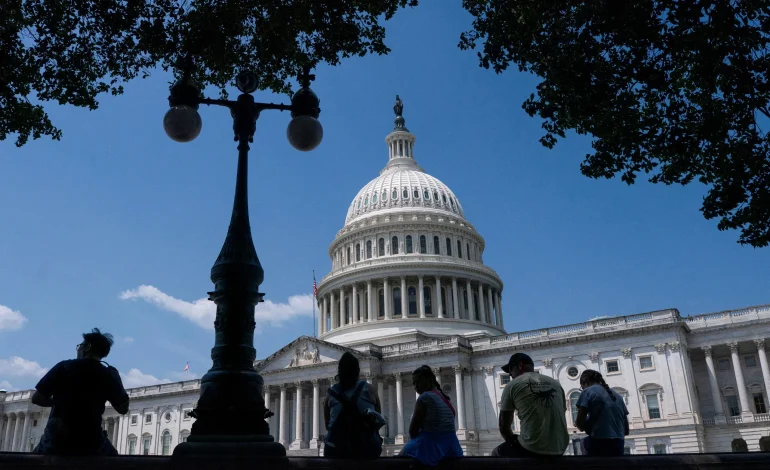As Senate Republicans move closer to a vote on the One Big Beautiful Bill Act (OBBBA), the sweeping federal budget and tax legislation championed by President Donald Trump, questions continue to mount over its long-term fiscal impact.
Despite mounting concerns from across the political spectrum, Senate leaders aim to secure passage this week, with a House vote potentially following by Wednesday, ahead of the July Fourth deadline set by the president.
The bill’s sheer scale — nearly 940 pages long — has drawn scrutiny over everything from deep Medicaid cuts to eliminated renewable energy tax credits, all while proposing significant tax reductions. According to early estimates by the Congressional Budget Office (CBO), the Senate version could add $3.3 trillion to the national debt over the next decade.
Despite the sizable fiscal implications, financial markets have responded relatively calmly. The S&P 500 slipped 0.1% in early trading Tuesday, after hitting a record high on Monday. Bond markets have also shown limited concern, with the 10-year Treasury yield holding steady at 4.27%, suggesting investors either anticipate the bill’s passage with minimal disruption or expect moderating adjustments before final approval.
Contentious elements in the Senate version — notably $930 billion in Medicaid cuts — have drawn criticism from both moderates and fiscal conservatives. Senator Thom Tillis (R-NC) condemned the impact on his state, citing a projected loss of coverage for over 660,000 residents, and announced he would not seek re-election in 2026.
The bill also scales back provisions from the Inflation Reduction Act, notably phasing out clean-energy tax credits and eliminating the $7,500 electric vehicle subsidy. Tesla CEO Elon Musk strongly criticized the legislation, arguing it would “destroy millions of jobs” and harm emerging industries. Musk has since suggested forming a new political party to challenge lawmakers who support the bill.
Yet, some amendments — including one from Senator Lisa Murkowski (R-AK) to preserve certain energy credits — may soften its impact and help secure final votes.
Critics argue that the bill’s underlying math simply doesn’t add up. Based on current law, the CBO estimates the Senate bill includes $4.47 trillion in tax cuts and $1.21 trillion in spending cuts, resulting in a $3.26 trillion deficit increase. Under a “current policy” baseline — assuming key tax provisions remain in place — the bill would reduce the deficit by $508 billion.
The divergence highlights the challenge in forecasting the bill’s full fiscal impact, especially as Republicans propose making the 2017 tax cuts permanent, introducing new tax exemptions for tips and overtime, and adding a Social Security tax credit. Some budget analysts, factoring in interest costs and likely renewals of temporary measures, peg the true cost of the bill closer to $5.3 trillion over 10 years.
Proponents point to historical data from the 2017 Tax Cuts and Jobs Act (TCJA), which, according to Trump administration economists, spurred strong income gains and corporate investment before the COVID-19 pandemic. New White House estimates argue that renewing and expanding the TCJA could lead to a 14.5% investment surge, boost real median incomes by $10,000, and offset the bill’s costs through enhanced growth.
Supporters also cite the administration’s tariff policies, projected by the CBO to raise $2.8 trillion in revenue over the next decade — although that figure is not included in the CBO’s score of the legislation.
Even if proponents are correct in projecting stronger growth, analysts warn that the scale of the bill could constrain future fiscal policy. With Social Security’s trust fund projected to run dry by 2033, reduced revenue from permanent tax cuts could limit options for long-term entitlement reform.
“The fiscal situation is so bad that the next president is going to have a bad time,” said Zach Moller, director of the economic program at Third Way, a center-left policy group.
Others, like Kent Smetters of the Wharton School, caution that relying on optimistic growth assumptions while pushing ahead with large-scale tax cuts could erode market confidence.
“If I’m bond markets, and I’m forward-looking… it’s a little depressing,” Smetters said.
Senate leaders are reportedly preparing a broad amendment package to win over the final votes, possibly modifying the Medicaid and renewable energy provisions. However, any changes risk alienating other factions within the Republican caucus, particularly fiscal hawks concerned about deficits.
The House remains a wild card. While many GOP members support the bill, some moderates and hardline conservatives are pushing for further revisions, either to soften spending cuts or reduce the overall cost of the package.
With input from the New York Times, Investor’s Business Daily, and USA Today.










The latest news in your social feeds
Subscribe to our social media platforms to stay tuned